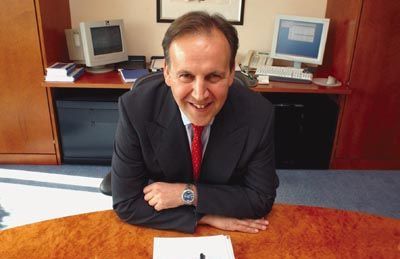You know Kipling’s words, about meeting triumph and disaster? Well, imagine this. You’re in your mid-forties, chief executive of one of Britain’s fastest-growing public companies.
You know Kipling’s words, about meeting triumph and disaster? Well, imagine this. You’re in your mid-forties, chief executive of one of Britain’s fastest-growing public companies. Your personal fortune is in nine figures; you are fast becoming one of the Britain’s top philanthropists; you own a luxury hotel in France. You’re on holiday with your family in Botswana, enjoying the fruits of success; you’re right in the middle of a sentence when suddenly, categorically, you cannot say another word … and you have no idea what’s happening to you. You’re rushed to hospital in South Africa, where a stroke is diagnosed. Back in London, however, a large and benign but potentially life-threatening tumour is discovered, lodged in your brain. There’s a flaw in the diamond, and you face your own mortality. Welcome to the world of Stanley Fink, who experienced such a shock just three years ago, when he was chief executive of Man Group, the listed hedge-fund manager for which I once worked.
Recently, Stanley and I sipped coffee in his modest office at Sugar Quay, overlooking the Thames. Permanently moored on the opposite bank is HMS Belfast, a reminder of days gone by when Man was the supplier to the Royal Navy of its daily rum tot. ‘You must have been absolutely terrified,’ I said. He nodded, adding: ‘But of course it was much worse for my family.’
Anyone who knows Stanley won’t be surprised at that remark. Many years ago, at our first meeting, I learnt the importance of his family to him. We were in a Swiss village called Steckborn, on the shores of Lake Constance.







Comments
Join the debate for just £1 a month
Be part of the conversation with other Spectator readers by getting your first three months for £3.
UNLOCK ACCESS Just £1 a monthAlready a subscriber? Log in